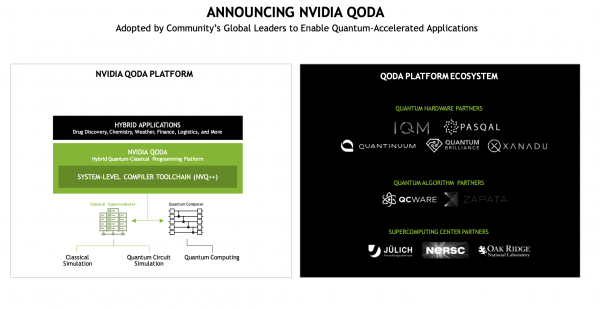GPU and accelerated-computing powerhouse Nvidia today announced a new programming platform – NVIDIA Quantum Optimized Device Architecture (QODA) – targeting development and management of applications run on hybrid classical-quantum systems. QODA joins cuQuantum, Nvidia’s quantum simulation SDK for use on GPU-accelerated systems. Unlike cuQuantum, QODA is intended for development and operation of hybrid quantum-classical applications on hybrid systems comprised of quantum processors and accelerated classical systems.
The idea of hybrid quantum-classical computing is straightforward and widely embraced. Many – perhaps most – applications run on quantum computers will actually be hybrid; some portions of the application will be better suited for classical systems and other portions only practical on quantum computers. Think of QODA, at least in part, as set of tools plus a compiler able to divide the tasks appropriately and translate the quantum-relevant portions into machine instructions for various quantum processors (QPUs).
In a prebriefing with HPCwire, Tim Costa, director of HPC and quantum computing products for Nvidia, said, “The hybrid term is kind of overused in the industry. What I mean is there are algorithms in applications which are best suited for a classical resource like a GPU and are implemented in a high-performance way to run on a GPU. There are also algorithms in the application which are best suited for a quantum computer. Those things are working together and data is moving back and forth.”
(What can be confusing is that all quantum computers are necessarily hybrid in the sense that classical computers are required to communicate [i.e., send control signals, interpret results] with QPUs. There is no other way. This is separate from splitting applications into pieces that are best run on either a classical or a quantum resource.)
The announcement of QODA, made at the Q2B22 Tokyo conference being held this week, provides more clarity around Nvidia’s quantum computing plans. Costa emphasized Nvidia has no plans to enter the QPU business. That said, Nvidia clearly sees quantum computing being integrated into the HPC landscape as another accelerator platform. Leveraging GPUs to accelerate pieces of hybrid quantum-classical applications is a natural fit. For example, dense matrix multiply operations may end up always being better performed by GPUs than QPUs.
QODA will become available sometime in 2022, said Costa. One immediate challenge for the new product is communicating with the many different flavors of qubits (ion trap, superconducting, photonic, etc.) It’s not clear which QPU technologies will prevail. Coincident with the QODA announcement, Nvidia announced collaborations with five quantum hardware makers, each using a different qubit technology. They include IQM Quantum Computers (superconducting qubits), Pasqal (neutral atoms), Quantinuum (ion trap), Quantum Brilliance (nitrogen vacancy [NV] in diamonds), and Xanadu (photonics).
“I want to emphasize it’s not a random selection,” Costa said. “It’s five different types of qubits, and that was really important to us as we were choosing our first set of partners. We wanted to make sure that we weren’t missing anything as we develop the programming model that would be required to program a type of qubit. We look forward in the near future to expanding the set of partners.” There are, of course, other companies working with those qubit technologies, and presumably, adapting QODA to work with them shouldn’t be too difficult.
Nvidia provided a couple of testimonials in its official announcement:
- “Quantinuum is partnering with NVIDIA to enable users of Quantinuum’s H-series quantum processors, powered by Honeywell, to program and develop the next generation of hybrid quantum-classical applications with QODA. This ties together the best performing classical computers with our world-class quantum processors,” said Alex Chernoguzov, chief engineer at Quantinuum.
- “The hybrid quantum-classical capabilities developed by NVIDIA will enable HPC developers to accelerate their existing applications by providing an efficient way to program quantum and classical resources in a consolidated environment,” said Yudong Cao, chief technology officer at Zapata. “Near-term applications in chemistry, drug discovery, materials science and more can now be seamlessly integrated with quantum computing, driving new discoveries in these fields as practical quantum advantage emerges.”
Nvidia also announced collaborations with two software providers, QC Ware and Zapata Computing, and several supercomputing centers including Forschungszentrum Jülich, Lawrence Berkeley National Laboratory and Oak Ridge National Laboratory.
It’s worth noting that Nvidia is a relative newcomer to the quantum computing ecosystem. Its push into quantum computing began with cuQuantum, introduced in 2021. The new offering, QODA, said Costa, is aimed at what Nvidia perceives as a gap in the market.
“Most of the effort in quantum computing software today focused on algorithm development,” said Costa. “So, a little smaller scale than might have been a full hybrid application. You also have a group of frameworks that have been developed are household names now [such as] Cirq, Qiskit and PennyLane. They are super important and that’s why the first product we released with cuQuantum was designed for them to make them more powerful.”
“But there’s a big gap between algorithm experimentation-based frameworks and building today’s GPU-accelerated scientific applications for quantum acceleration as they move towards hybrid classical-quantum computing. To do that we need to transition from algorithm development by quantum physicists to application development by domain scientists and we need a development platform that’s built for hybrid quantum classical computing that delivers the performance interoperates with today’s applications and programming paradigms, and is familiar to those scientists,” he said.
Nvidia, of course, isn’t alone in seeking to ease application development and management for quantum and hybrid quantum-classical resources. Start-up Agnostiq, for example, has an open source product (Covalent) aimed at workflow development for heterogeneous HPC environments that include quantum resources.
How quantum acceleration will fit into the broader HPC puzzle and forms it will take has yet to play out. Today, quantum computing remains mostly a developmental endeavor although that’s rapidly changing. Nvidia recognizes this.
“It’s well understood that real quantum advantage, where you get differentiation from classical computing by including quantum computing in your in your application, generally comes in the era of fault tolerant quantum computing, with millions of qubits that are error corrected with thousands of qubits. That’s still far away with a lot of work to do. But the investment across many different areas is stepping up to meet that challenge and push the industry forward. There are 22 national quantum initiatives around the world. Over 70 percent of the world’s leading corporations have some kind of quantum initiative, the scale and size varies tremendously, but some kind. There’s lot of research papers coming out. Then a sea of startups 250 or more, and some of them with quite large valuations,” said Costa.
Nvidia is naturally architecting QODA to work best with its products (GPUs and software) but has also created hooks to other tools such as C++ and Python.
“Certainly our emphasis and where we’re spending our blood, sweat and tears is on making sure that you get the absolute best performance when running on Nvidia GPUs. That’s what cuQuantum is built for on the quantum emulation side. I will say that the way we’re building code that the QODA compiler can be a partner compiler to other compilers. We have compilers on our end, and NVC++ is a good example. It’s both an accelerator GPU compiler and a high-performance CPU compiler and you can pair that with QODA,” said Costa.
Nvidia has been working on an NVQ++ compiler that targets the Community Intermediate Representation (QIR Alliance) “a specification of a low-level machine language that quantum and classical computers can use to talk to each other.”
Work with collaborators is ongoing to get QODA ready.
Costa said, “In some cases we are actually providing the output of our compiler and having it run on the on their QPU. For others, we’re not quite at that stage yet and we’re collaborating on what the programming model is to ensure it does exactly what’s needed. So there’s multiple layers of an implementation here. The QODA programming model is what faces the user. We’re also hoping to get our own quantum MLIR dialect (multi-level intermediate representation) and lower that into the QIR, which is the community’s intermediate representation. From there it goes to the QPUs. So, there’s multiple stages that we’re partnering with these companies to make sure QODA can work with their systems as we develop the tool chain.”
The full path to market for QODA isn’t clear. Nvidia did not announce any web portal partners at the announcement, but Costa says that will happen soon, and Nvidia already has deep relationships with major cloud providers, including recent incorporation of cuQuantum into Amazon’s Braket portal.
Stay tuned.
Link to Nvidia announcement, https://www.hpcwire.com/off-the-wire/nvidia-announces-hybrid-quantum-classical-computing-platform/
Link to Nvidia blog: https://blogs.nvidia.com/blog/2022/07/12/quantum-qoda-julich/
































































